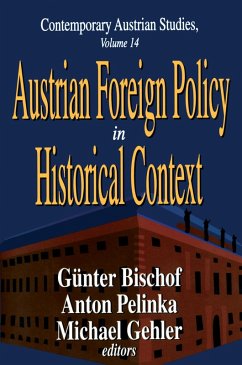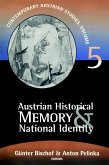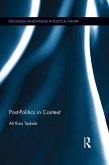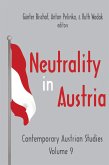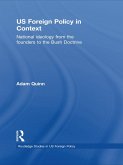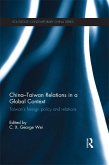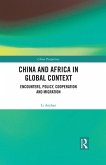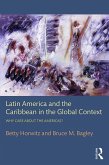Anton Pelinka, Gunter Bischof, Michael Gehler
Austrian Foreign Policy in Historical Context (eBook, PDF)
35,95 €
35,95 €
inkl. MwSt.
Sofort per Download lieferbar

18 °P sammeln
35,95 €
Als Download kaufen

35,95 €
inkl. MwSt.
Sofort per Download lieferbar

18 °P sammeln
Jetzt verschenken
Alle Infos zum eBook verschenken
35,95 €
inkl. MwSt.
Sofort per Download lieferbar
Alle Infos zum eBook verschenken

18 °P sammeln
Anton Pelinka, Gunter Bischof, Michael Gehler
Austrian Foreign Policy in Historical Context (eBook, PDF)
- Format: PDF
- Merkliste
- Auf die Merkliste
- Bewerten Bewerten
- Teilen
- Produkt teilen
- Produkterinnerung
- Produkterinnerung

Bitte loggen Sie sich zunächst in Ihr Kundenkonto ein oder registrieren Sie sich bei
bücher.de, um das eBook-Abo tolino select nutzen zu können.
Hier können Sie sich einloggen
Hier können Sie sich einloggen
Sie sind bereits eingeloggt. Klicken Sie auf 2. tolino select Abo, um fortzufahren.

Bitte loggen Sie sich zunächst in Ihr Kundenkonto ein oder registrieren Sie sich bei bücher.de, um das eBook-Abo tolino select nutzen zu können.
In 2005, Austria celebrated the sixtieth anniversary of its liberation from the Nazi regime and the fiftieth anniversary of the State Treaty that ended the occupation and returned full sovereignty to the country
- Geräte: PC
- mit Kopierschutz
- eBook Hilfe
- Größe: 10.77MB
Andere Kunden interessierten sich auch für
![Austrian Historical Memory and National Identity (eBook, PDF) Austrian Historical Memory and National Identity (eBook, PDF)]() Gunter BischofAustrian Historical Memory and National Identity (eBook, PDF)48,95 €
Gunter BischofAustrian Historical Memory and National Identity (eBook, PDF)48,95 €![Post-Politics in Context (eBook, PDF) Post-Politics in Context (eBook, PDF)]() Ali Riza TaskalePost-Politics in Context (eBook, PDF)49,95 €
Ali Riza TaskalePost-Politics in Context (eBook, PDF)49,95 €![Neutrality in Austria (eBook, PDF) Neutrality in Austria (eBook, PDF)]() Neutrality in Austria (eBook, PDF)51,95 €
Neutrality in Austria (eBook, PDF)51,95 €![US Foreign Policy in Context (eBook, PDF) US Foreign Policy in Context (eBook, PDF)]() Adam QuinnUS Foreign Policy in Context (eBook, PDF)57,95 €
Adam QuinnUS Foreign Policy in Context (eBook, PDF)57,95 €![China-Taiwan Relations in a Global Context (eBook, PDF) China-Taiwan Relations in a Global Context (eBook, PDF)]() China-Taiwan Relations in a Global Context (eBook, PDF)54,95 €
China-Taiwan Relations in a Global Context (eBook, PDF)54,95 €![China and Africa in Global Context (eBook, PDF) China and Africa in Global Context (eBook, PDF)]() Li AnshanChina and Africa in Global Context (eBook, PDF)64,95 €
Li AnshanChina and Africa in Global Context (eBook, PDF)64,95 €![Latin America and the Caribbean in the Global Context (eBook, PDF) Latin America and the Caribbean in the Global Context (eBook, PDF)]() Betty HorwitzLatin America and the Caribbean in the Global Context (eBook, PDF)50,95 €
Betty HorwitzLatin America and the Caribbean in the Global Context (eBook, PDF)50,95 €-
-
-
In 2005, Austria celebrated the sixtieth anniversary of its liberation from the Nazi regime and the fiftieth anniversary of the State Treaty that ended the occupation and returned full sovereignty to the country
Dieser Download kann aus rechtlichen Gründen nur mit Rechnungsadresse in A, B, BG, CY, CZ, D, DK, EW, E, FIN, F, GR, HR, H, IRL, I, LT, L, LR, M, NL, PL, P, R, S, SLO, SK ausgeliefert werden.
Produktdetails
- Produktdetails
- Verlag: Taylor & Francis eBooks
- Seitenzahl: 423
- Erscheinungstermin: 30. November 2017
- Englisch
- ISBN-13: 9781351315159
- Artikelnr.: 50406556
- Verlag: Taylor & Francis eBooks
- Seitenzahl: 423
- Erscheinungstermin: 30. November 2017
- Englisch
- ISBN-13: 9781351315159
- Artikelnr.: 50406556
- Herstellerkennzeichnung Die Herstellerinformationen sind derzeit nicht verfügbar.
Anton Pelinka, Gunter Bischof, Michael Gehler
1: Introduction; 3: Austrian Foreign Policy after World War II; 2: Topical
Essays; I: Introduction; 4: Diplomats: Symbols of Sovereignty become
Managers of Interdependence: The Transformation of the Austrian Diplomatic
Service; 5: An Institutional History of the Austrian Foreign Office in the
Twentieth Century; 6: Sources on the Diplomacy of the Ballhausplatz; II:
Late Habsburg and First Republic Foreign Policy; 7: The Militarization of
Austrian Foreign Policy on the Eve of World War I; 8: Austria between
Mussolini and Hitler: War by Other Means; III: Second Republic Foreign
Policy: Turning Points and Continuities; 9: Between East and West: The
Origins of Post-World War II Austrian Diplomacy during the Early Occupation
Period; 10: Neutral Encounters of the Paranoid Kind: Austria's Reactions to
the Hungarian Crisis of 1956; Kreisky - Brandt - Khrushchev: The United
States and Austrian Mediation during the Berlin Crisis, 1958-1963; 12: From
Cooperation to Integration: The Foreign Policy/ies of the Austrian Länder;
13: ESDP and Austria: Security Policy between Engagement and Neutrality;
14: Foreign Policy in the Age of Globalization: Does Globalization
Constrain Nation States' Sovereignty in Conceiving and Maintaining their
Foreign Policy?; 15: Recent Balkans Diplomacy from an Austrian Perspective;
3: Non-Topical Essay; 16: The Institutionalization of American Studies at
Austrian Universities: The Innsbruck Model; 4: Roundtable 1; 5: The
Historiography and Memory of the Austrian Occupation (1945-1955); 17: The
Allied Occupation of Austria in Recent International and Austrian
Historiography; 18: The "Allied Occuption" and the Collective Memory of
Austrians after 1945: "Ending a 17 year-long path of bondage full of
thorns" (Leopold Figl, 15 May 1955); 19: Still "Occupied" by Germany
1945-1955? Arguments, Concepts, and Strategies in the Austrian Struggle
against a Crucial Dependence; 20: Soviet Plans and Policies for Austria's
Transition to Socialism, 1945-1955; 21: Stalin and the Austrian Question 1;
6: Review Essays; 22: Borders in Recent Austrian Historiography; 23:
Provenance Research as History: Reconstructed Collections and National
Socialist Art Looting; 24: The Cold War and 1956 in Hungary; 7: Book
Reviews; 25: Georg Rigele, Zwischen Monopol und Markt. EVN das Energie- und
Infrastrukturunternehmen (Maria Enzersdorf: Selbstverlag der EVN AG, 2004);
26: Rupert Pichler, ed., Innovationsmuster in der österreichischen
Wirtschaftsgeschichte. Wirtschaftliche Entwicklung, Unternehmen, Politik
und Innovationsverhalten im 19. und 20. Jahrhundert (Innsbruck:
Studienverlag, 2003); 27: Matti Bunzl, Symptoms of Modernity: Jews and
Queers in Late Twentieth-Century Vienna (Berkeley: Univ. of California
Press, 2004); 28: Margareth Lun, NS-Herrschaft in Siidtirol Die
Operationszone Alpenvorland 1943-1945 (Innsbrucker Forschungen zur
Zeitgeschichte 15) (Innsbruck: Studienyerlag, 2004); 29: James Jay
Carafano, Waltzing into the Cold War. The Struggle of Occupied Austria
(College Station: Texas A&M University Press, 2002); 30: Heinz P.
Wassermann, Verfälschte Geschichte im Unterricht. Nationalsozialismus und
Österreich nach 1945 (Vienna: StudienVerlag, 2004); 8: Annual Review; 31:
Austria 2004; 32: List of Authors
Essays; I: Introduction; 4: Diplomats: Symbols of Sovereignty become
Managers of Interdependence: The Transformation of the Austrian Diplomatic
Service; 5: An Institutional History of the Austrian Foreign Office in the
Twentieth Century; 6: Sources on the Diplomacy of the Ballhausplatz; II:
Late Habsburg and First Republic Foreign Policy; 7: The Militarization of
Austrian Foreign Policy on the Eve of World War I; 8: Austria between
Mussolini and Hitler: War by Other Means; III: Second Republic Foreign
Policy: Turning Points and Continuities; 9: Between East and West: The
Origins of Post-World War II Austrian Diplomacy during the Early Occupation
Period; 10: Neutral Encounters of the Paranoid Kind: Austria's Reactions to
the Hungarian Crisis of 1956; Kreisky - Brandt - Khrushchev: The United
States and Austrian Mediation during the Berlin Crisis, 1958-1963; 12: From
Cooperation to Integration: The Foreign Policy/ies of the Austrian Länder;
13: ESDP and Austria: Security Policy between Engagement and Neutrality;
14: Foreign Policy in the Age of Globalization: Does Globalization
Constrain Nation States' Sovereignty in Conceiving and Maintaining their
Foreign Policy?; 15: Recent Balkans Diplomacy from an Austrian Perspective;
3: Non-Topical Essay; 16: The Institutionalization of American Studies at
Austrian Universities: The Innsbruck Model; 4: Roundtable 1; 5: The
Historiography and Memory of the Austrian Occupation (1945-1955); 17: The
Allied Occupation of Austria in Recent International and Austrian
Historiography; 18: The "Allied Occuption" and the Collective Memory of
Austrians after 1945: "Ending a 17 year-long path of bondage full of
thorns" (Leopold Figl, 15 May 1955); 19: Still "Occupied" by Germany
1945-1955? Arguments, Concepts, and Strategies in the Austrian Struggle
against a Crucial Dependence; 20: Soviet Plans and Policies for Austria's
Transition to Socialism, 1945-1955; 21: Stalin and the Austrian Question 1;
6: Review Essays; 22: Borders in Recent Austrian Historiography; 23:
Provenance Research as History: Reconstructed Collections and National
Socialist Art Looting; 24: The Cold War and 1956 in Hungary; 7: Book
Reviews; 25: Georg Rigele, Zwischen Monopol und Markt. EVN das Energie- und
Infrastrukturunternehmen (Maria Enzersdorf: Selbstverlag der EVN AG, 2004);
26: Rupert Pichler, ed., Innovationsmuster in der österreichischen
Wirtschaftsgeschichte. Wirtschaftliche Entwicklung, Unternehmen, Politik
und Innovationsverhalten im 19. und 20. Jahrhundert (Innsbruck:
Studienverlag, 2003); 27: Matti Bunzl, Symptoms of Modernity: Jews and
Queers in Late Twentieth-Century Vienna (Berkeley: Univ. of California
Press, 2004); 28: Margareth Lun, NS-Herrschaft in Siidtirol Die
Operationszone Alpenvorland 1943-1945 (Innsbrucker Forschungen zur
Zeitgeschichte 15) (Innsbruck: Studienyerlag, 2004); 29: James Jay
Carafano, Waltzing into the Cold War. The Struggle of Occupied Austria
(College Station: Texas A&M University Press, 2002); 30: Heinz P.
Wassermann, Verfälschte Geschichte im Unterricht. Nationalsozialismus und
Österreich nach 1945 (Vienna: StudienVerlag, 2004); 8: Annual Review; 31:
Austria 2004; 32: List of Authors
1: Introduction; 3: Austrian Foreign Policy after World War II; 2: Topical
Essays; I: Introduction; 4: Diplomats: Symbols of Sovereignty become
Managers of Interdependence: The Transformation of the Austrian Diplomatic
Service; 5: An Institutional History of the Austrian Foreign Office in the
Twentieth Century; 6: Sources on the Diplomacy of the Ballhausplatz; II:
Late Habsburg and First Republic Foreign Policy; 7: The Militarization of
Austrian Foreign Policy on the Eve of World War I; 8: Austria between
Mussolini and Hitler: War by Other Means; III: Second Republic Foreign
Policy: Turning Points and Continuities; 9: Between East and West: The
Origins of Post-World War II Austrian Diplomacy during the Early Occupation
Period; 10: Neutral Encounters of the Paranoid Kind: Austria's Reactions to
the Hungarian Crisis of 1956; Kreisky - Brandt - Khrushchev: The United
States and Austrian Mediation during the Berlin Crisis, 1958-1963; 12: From
Cooperation to Integration: The Foreign Policy/ies of the Austrian Länder;
13: ESDP and Austria: Security Policy between Engagement and Neutrality;
14: Foreign Policy in the Age of Globalization: Does Globalization
Constrain Nation States' Sovereignty in Conceiving and Maintaining their
Foreign Policy?; 15: Recent Balkans Diplomacy from an Austrian Perspective;
3: Non-Topical Essay; 16: The Institutionalization of American Studies at
Austrian Universities: The Innsbruck Model; 4: Roundtable 1; 5: The
Historiography and Memory of the Austrian Occupation (1945-1955); 17: The
Allied Occupation of Austria in Recent International and Austrian
Historiography; 18: The "Allied Occuption" and the Collective Memory of
Austrians after 1945: "Ending a 17 year-long path of bondage full of
thorns" (Leopold Figl, 15 May 1955); 19: Still "Occupied" by Germany
1945-1955? Arguments, Concepts, and Strategies in the Austrian Struggle
against a Crucial Dependence; 20: Soviet Plans and Policies for Austria's
Transition to Socialism, 1945-1955; 21: Stalin and the Austrian Question 1;
6: Review Essays; 22: Borders in Recent Austrian Historiography; 23:
Provenance Research as History: Reconstructed Collections and National
Socialist Art Looting; 24: The Cold War and 1956 in Hungary; 7: Book
Reviews; 25: Georg Rigele, Zwischen Monopol und Markt. EVN das Energie- und
Infrastrukturunternehmen (Maria Enzersdorf: Selbstverlag der EVN AG, 2004);
26: Rupert Pichler, ed., Innovationsmuster in der österreichischen
Wirtschaftsgeschichte. Wirtschaftliche Entwicklung, Unternehmen, Politik
und Innovationsverhalten im 19. und 20. Jahrhundert (Innsbruck:
Studienverlag, 2003); 27: Matti Bunzl, Symptoms of Modernity: Jews and
Queers in Late Twentieth-Century Vienna (Berkeley: Univ. of California
Press, 2004); 28: Margareth Lun, NS-Herrschaft in Siidtirol Die
Operationszone Alpenvorland 1943-1945 (Innsbrucker Forschungen zur
Zeitgeschichte 15) (Innsbruck: Studienyerlag, 2004); 29: James Jay
Carafano, Waltzing into the Cold War. The Struggle of Occupied Austria
(College Station: Texas A&M University Press, 2002); 30: Heinz P.
Wassermann, Verfälschte Geschichte im Unterricht. Nationalsozialismus und
Österreich nach 1945 (Vienna: StudienVerlag, 2004); 8: Annual Review; 31:
Austria 2004; 32: List of Authors
Essays; I: Introduction; 4: Diplomats: Symbols of Sovereignty become
Managers of Interdependence: The Transformation of the Austrian Diplomatic
Service; 5: An Institutional History of the Austrian Foreign Office in the
Twentieth Century; 6: Sources on the Diplomacy of the Ballhausplatz; II:
Late Habsburg and First Republic Foreign Policy; 7: The Militarization of
Austrian Foreign Policy on the Eve of World War I; 8: Austria between
Mussolini and Hitler: War by Other Means; III: Second Republic Foreign
Policy: Turning Points and Continuities; 9: Between East and West: The
Origins of Post-World War II Austrian Diplomacy during the Early Occupation
Period; 10: Neutral Encounters of the Paranoid Kind: Austria's Reactions to
the Hungarian Crisis of 1956; Kreisky - Brandt - Khrushchev: The United
States and Austrian Mediation during the Berlin Crisis, 1958-1963; 12: From
Cooperation to Integration: The Foreign Policy/ies of the Austrian Länder;
13: ESDP and Austria: Security Policy between Engagement and Neutrality;
14: Foreign Policy in the Age of Globalization: Does Globalization
Constrain Nation States' Sovereignty in Conceiving and Maintaining their
Foreign Policy?; 15: Recent Balkans Diplomacy from an Austrian Perspective;
3: Non-Topical Essay; 16: The Institutionalization of American Studies at
Austrian Universities: The Innsbruck Model; 4: Roundtable 1; 5: The
Historiography and Memory of the Austrian Occupation (1945-1955); 17: The
Allied Occupation of Austria in Recent International and Austrian
Historiography; 18: The "Allied Occuption" and the Collective Memory of
Austrians after 1945: "Ending a 17 year-long path of bondage full of
thorns" (Leopold Figl, 15 May 1955); 19: Still "Occupied" by Germany
1945-1955? Arguments, Concepts, and Strategies in the Austrian Struggle
against a Crucial Dependence; 20: Soviet Plans and Policies for Austria's
Transition to Socialism, 1945-1955; 21: Stalin and the Austrian Question 1;
6: Review Essays; 22: Borders in Recent Austrian Historiography; 23:
Provenance Research as History: Reconstructed Collections and National
Socialist Art Looting; 24: The Cold War and 1956 in Hungary; 7: Book
Reviews; 25: Georg Rigele, Zwischen Monopol und Markt. EVN das Energie- und
Infrastrukturunternehmen (Maria Enzersdorf: Selbstverlag der EVN AG, 2004);
26: Rupert Pichler, ed., Innovationsmuster in der österreichischen
Wirtschaftsgeschichte. Wirtschaftliche Entwicklung, Unternehmen, Politik
und Innovationsverhalten im 19. und 20. Jahrhundert (Innsbruck:
Studienverlag, 2003); 27: Matti Bunzl, Symptoms of Modernity: Jews and
Queers in Late Twentieth-Century Vienna (Berkeley: Univ. of California
Press, 2004); 28: Margareth Lun, NS-Herrschaft in Siidtirol Die
Operationszone Alpenvorland 1943-1945 (Innsbrucker Forschungen zur
Zeitgeschichte 15) (Innsbruck: Studienyerlag, 2004); 29: James Jay
Carafano, Waltzing into the Cold War. The Struggle of Occupied Austria
(College Station: Texas A&M University Press, 2002); 30: Heinz P.
Wassermann, Verfälschte Geschichte im Unterricht. Nationalsozialismus und
Österreich nach 1945 (Vienna: StudienVerlag, 2004); 8: Annual Review; 31:
Austria 2004; 32: List of Authors
